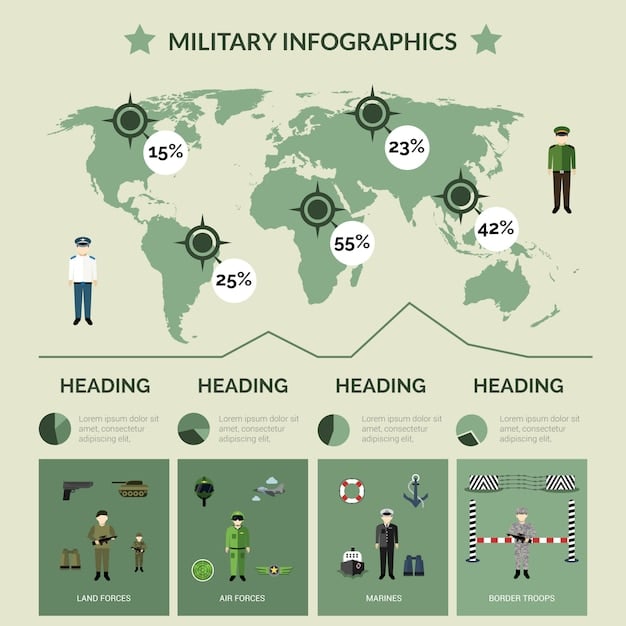The Rise of Private Military Companies: Implications for US Foreign Policy

The rise of private military companies (PMCs) has significantly altered the landscape of global conflicts, posing complex challenges and implications for US foreign policy.
The increasing reliance on private military companies, or PMCs, has reshaped the dynamics of modern warfare and presents intricate challenges for US foreign policy. This article examines the rise of private military companies: implications for global conflicts and US foreign policy, exploring their impact on international relations and the US’s strategic interests.
Understanding the Landscape of Private Military Companies
Private military companies (PMCs) have become increasingly prominent in the theater of global conflicts. These entities offer a range of services, from security and training to direct combat support, blurring the lines between traditional military operations and private enterprise. Understanding their evolving roles and impact is crucial.
PMCs are not a new phenomenon, but their scale and scope of operations have grown significantly since the end of the Cold War. Several factors contribute to this growth, including the downsizing of national militaries, the increasing complexity of modern warfare, and the desire of governments to outsource certain military functions.
Historical Context and Evolution of PMCs
The history of PMCs can be traced back to the mercenary groups of ancient times. However, the modern PMC industry emerged in the late 20th century. Early PMCs primarily focused on providing security services to private companies in conflict zones.
- Post-Cold War Expansion: The end of the Cold War led to a surplus of military personnel and equipment, which fueled the growth of the PMC industry.
- Changing Nature of Conflict: The rise of asymmetric warfare and counterterrorism operations increased the demand for specialized skills and services that PMCs could provide.
- Government Outsourcing: Governments began to outsource certain military functions to PMCs in an effort to reduce costs and personnel burdens.

Key Services Provided by PMCs
PMCs offer a wide array of services that extend beyond traditional security roles. These services often include training local forces, providing logistical support, and even engaging in direct combat operations.
The flexibility and specialization that PMCs offer make them attractive to governments and organizations operating in volatile regions. However, this reliance also raises ethical and legal concerns.
In conclusion, understanding the landscape of private military companies requires a comprehensive analysis of their historical evolution, the services they provide, and the factors driving their increasing prominence in global conflicts.
The Role of PMCs in Modern Conflicts
PMCs play diverse and critical roles in contemporary conflicts, extending their influence across various aspects of warfare. Their involvement raises questions about accountability, oversight, and the overall impact on conflict dynamics.
The operational footprint of PMCs spans from providing security for critical infrastructure to training local military forces and, in some cases, participating directly in combat operations. Their presence is particularly notable in regions with weak governance and ongoing instability.
Impact on Conflict Dynamics
The involvement of PMCs in conflict dynamics is complex and multifaceted. Their presence can alter the balance of power, affect the duration and intensity of conflicts, and influence the behavior of state and non-state actors.
While PMCs can enhance the capabilities of local forces and contribute to stability, their involvement also carries the risk of exacerbating tensions, fueling corruption, and undermining local governance structures.
Case Studies of PMC Involvement
Examining specific case studies of PMC involvement in conflicts provides valuable insights into their impact and implications.
- Iraq and Afghanistan: PMCs played a significant role in providing security, logistics, and training services to US forces and local governments.
- Africa: PMCs have been involved in conflicts in various African countries, often providing security for natural resources and infrastructure.
- Eastern Europe: PMCs have been implicated in conflicts in Eastern Europe, raising concerns about their role in geopolitical tensions.

Overall, PMCs have become deeply embedded in the fabric of modern conflicts, shaping their dynamics, impacting local populations, and influencing the behavior of various actors involved.
Ethical and Legal Considerations
The use of private military companies raises profound ethical and legal concerns that demand careful scrutiny. The lack of clear accountability and oversight mechanisms creates a breeding ground for potential abuses and violations of international law.
Addressing these ethical and legal challenges requires international cooperation, regulatory frameworks, and robust enforcement mechanisms to ensure that PMCs operate within the bounds of the law and adhere to ethical standards.
Accountability and Oversight
One of the primary concerns surrounding PMCs is the lack of clear accountability and oversight mechanisms. Unlike state military forces, PMCs often operate in a legal gray area, making it difficult to hold them accountable for their actions.
This lack of accountability can lead to human rights abuses, violations of international humanitarian law, and impunity for misconduct. Strengthening oversight and accountability mechanisms is crucial to ensure that PMCs are held responsible for their actions.
International Law and Regulations
The international legal framework governing the activities of PMCs is fragmented and incomplete. While some international treaties and conventions address certain aspects of PMC operations, there is no comprehensive legal regime that specifically regulates their activities.
- Montreux Document: A non-binding agreement that provides guidance on the responsibilities of states regarding PMCs operating in armed conflicts.
- International Code of Conduct for Private Security Service Providers (ICoC): A voluntary code of conduct that sets ethical and professional standards for PMCs.
- National Regulations: Some countries have enacted national laws and regulations to govern the activities of PMCs operating within their borders.
In conclusion, addressing the ethical and legal implications of private military companies requires a concerted effort to strengthen accountability, develop robust oversight mechanisms, and establish a clear and comprehensive international legal framework.
Implications for US Foreign Policy
The rise of PMCs presents significant implications for US foreign policy. As the US increasingly relies on PMCs to achieve its foreign policy objectives, it must carefully consider the risks and benefits of this approach.
Navigating the complexities of PMC involvement in US foreign policy requires a balanced approach that acknowledges their potential advantages while mitigating the risks and ensuring that their actions align with US values and strategic interests.
Benefits and Risks of PMC Use
The use of PMCs in US foreign policy offers several potential benefits, including cost savings, increased flexibility, and access to specialized skills. However, it also carries several risks, including lack of accountability, potential for mission creep, and damage to US credibility.
Careful consideration of these benefits and risks is essential to ensure that the use of PMCs aligns with US foreign policy objectives and values.
Oversight and Regulation in the US Context
The US government has taken steps to regulate the use of PMCs, but significant gaps remain. Effective oversight and regulation are crucial to ensure that PMCs operate within the bounds of the law and adhere to ethical standards.
- Department of Defense Regulations: The DoD has implemented regulations governing the use of PMCs in its operations, including requirements for training, vetting, and oversight.
- State Department Regulations: The State Department also has regulations governing the use of PMCs, particularly in the context of diplomatic security and foreign assistance programs.
- Congressional Oversight: Congress plays a crucial role in overseeing the use of PMCs through its appropriations and oversight committees.
Going forward, the United States needs to evaluate and adapt the use of PMCs to guarantee coherence with foreign policy objectives, as well as to safeguard worldwide interests.
The Future of Private Military Companies
The trajectory of PMCs in the coming years is subject to various factors, including changes in the geopolitical landscape, technological advancements, and evolving legal and regulatory frameworks.
Understanding potential future trends and challenges is essential to preparing for the evolving role of PMCs in global conflicts and ensuring that their activities align with ethical standards and strategic objectives.
Potential Future Trends
Several potential trends could shape the future of the PMC industry. These trends include the increasing use of technology, the rise of new players in the industry, and the growing demand for specialized services.
The use of drones, artificial intelligence, and cyber capabilities could transform the way PMCs operate and increase their effectiveness. However, it also raises new ethical and legal concerns that must be addressed.
Challenges and Opportunities
The PMC industry faces several challenges, including reputational issues, regulatory uncertainty, and competition from state-owned enterprises. However, it also presents several opportunities, including expanding into new markets, developing innovative services, and partnering with governments and international organizations.
- Reputational Issues: PMCs often face reputational challenges due to past misconduct and lack of transparency.
- Regulatory Uncertainty: The lack of a clear and comprehensive international legal framework creates regulatory uncertainty for PMCs.
- State-Owned Enterprises: PMCs face competition from state-owned enterprises that may have access to greater resources and political influence.
Conclusion
In conclusion, the future of private military companies hinges on their ability to adapt to emerging challenges, mitigate risks, and adhere to ethical principles. Their operations will continue to influence global conflicts and US foreign policy.
| Key Point | Brief Description |
|---|---|
| 🛡️ Role of PMCs | PMCs engage in security, training, and combat support in conflicts. |
| ⚖️ Ethical Concerns | Lack of accountability and oversight lead to ethical dilemmas. |
| 🇺🇸 US Policy | US foreign policy benefits from PMCs, but there are risks and regulations. |
| 🔮 Future Trends | Technological advances and market shifts will shape the PMC industry. |
Frequently Asked Questions
▼
Private military companies (PMCs) are businesses that offer military services to governments, organizations, and individuals. Their services often include security, training, and combat support.
▼
PMCs are used in modern conflicts for several reasons, including cost-effectiveness, access to specialized skills, and the desire to outsource certain military functions. They are often used in unstable regions.
▼
Ethical concerns include the lack of accountability, potential for human rights abuses, and the blurring of lines between military and civilian roles. Oversight is often difficult to enforce effectively.
▼
The US regulates PMCs through the Department of Defense and State Department regulations, as well as congressional oversight. These regulations aim to ensure ethical standards and legal compliance.
▼
The future of PMCs may involve greater use of technology like drones and AI, expansion into new markets, and adaptation to evolving legal frameworks. New challenges and opportunities will emerge.
Conclusion
The rise of private military companies raises important questions about the future of warfare and the role of the United States in global conflicts. By understanding the implications of PMC use, policymakers and citizens can make informed decisions about the appropriate role for these entities in US foreign policy.





